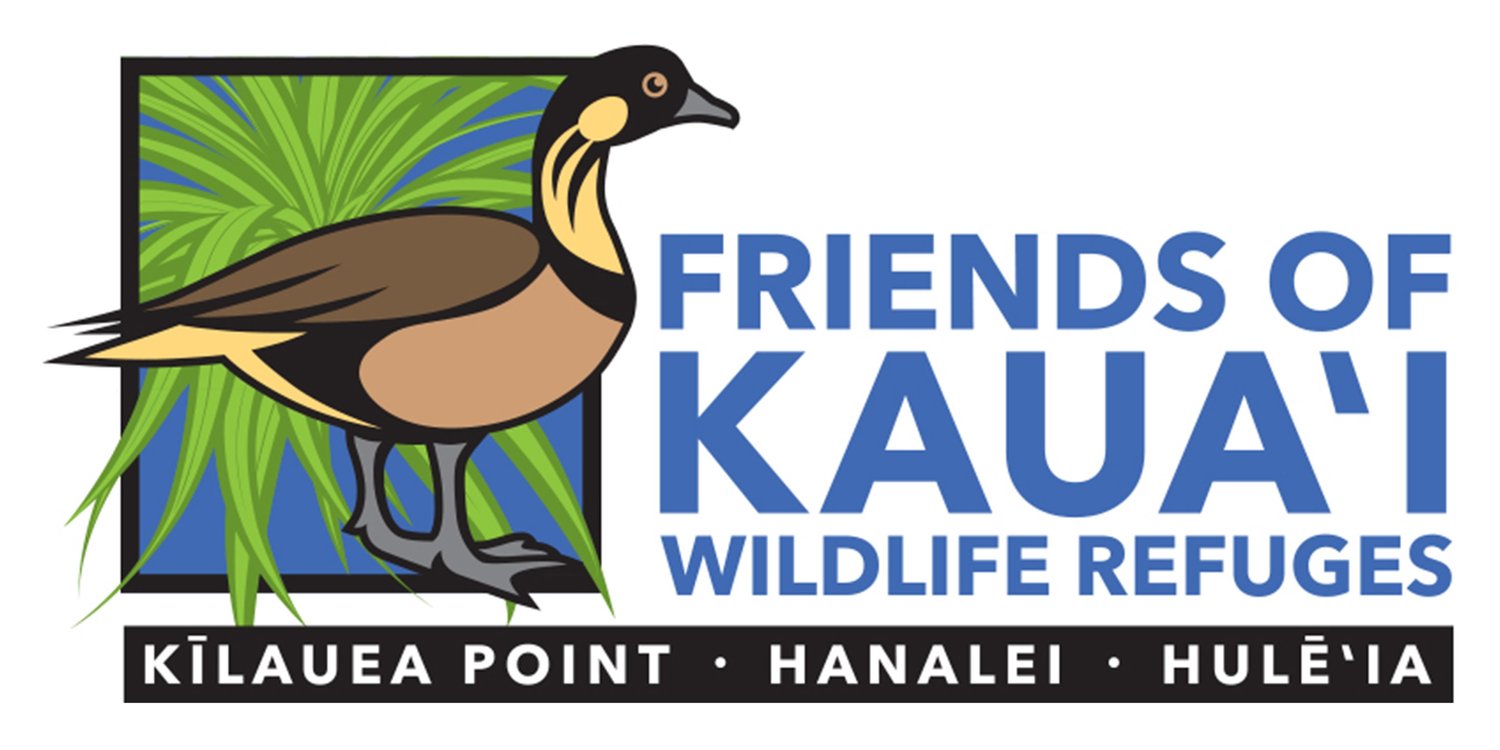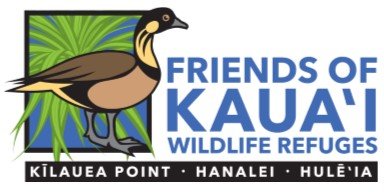Together we protect, preserve, educate and inspire…
-

National Advocacy
The National Wildlife Refuge Association advocates for our Refuges at a national level. Connect with them to learn how your voice can support legislation that helps our local Refuges thrive and grow.
-

Act Locally
There are a number of issues threatening our wildlife. One of them is feral cats. Learn more below and help us shift the awareness and actions of our community members and help make our island safer for the threatened and endangered wildlife we support.
-

Learn how to help our ecosystem
Small behaviors can achieve a great deal when we work together. It starts with awareness and can result in massive improvements within our environment.
-

It takes a colony...
Friends of Kauaʻi Wildlife Refuges is proud to work with a number of wonderful organizations locally, regionally and nationally.
7 Things You Can Do To Help Our Birds
1. Reduce your use of single-use plastics
Every year discarded plastics kill hundreds of thousands of seabirds birds and other marine mammals when they become entangled in and ingest our waste. At Kīlauea Point NWR, our mōlī (Laysan Albatross) chicks are particularly vulnerable because their parents inadvertently bring back plastics to feed them. If they are fed too much plastic, they can starve.
2. Curb your cats
Keep your felines inside and please do not feed feral cats. In the U.S. alone, America’s estimated 150 million outdoor, feral and free-roaming cats kill an astounding 2.4 billion birds annually (learn more). Locally, it is estimated that there are over 20,000 feral cats across the Island of Kauaʻi. Our native ground-nesting birds evolved without predators and have no way to defend themselves, their nests or their chicks.
3. Limit outdoor lighting
Man-made lights can be very disorienting for bird species across the globe. The ʻaʻo (Newell’s Shearwaters) are very susceptible during their fledging season of September to December. They use the moon and stars as guides for their first flight out to sea and we lose many of them each year when they are attracted to man-made lights. In urban areas, glass-fronted buildings with bright nighttime lighting can be deadly. Sadly, up to a billion birds, mostly migratory birds, are killed in building collisions across North America each year.
4. Forgo pesticides
U.S. researchers estimate that agricultural use of pesticides kills 67 million birds each year. Pesticides also cause longer-term, potentially lethal effects, ranging from eggshell thinning to neurological damage and may also be linked to human food allergies.
5. Make your yard a bird oasis
To support birds in your backyard, provide clean water, native plants with flowers for nectar and insects, fruit-bearing plants to provide fuel for migration and winter, layers of plants for cover and thermal protection, and nesting habitat and materials.
6. Create communities
Share your passion for birds with family and friends and expand your patch of bird habitat into a larger urban oasis by working with neighbors and managers of nearby parks, golf courses and farms.
7. Shop for the birds
There are several ways to help. Conventionally produced beef comes from animals fed corn and soybeans, crops grown on what used to be the great American prairie. Buying grass-fed meat supports grassland birds which, because of habitat loss, are showing the most sustained declines of any bird group in the United States. Also, switch to shade-grown coffee, helping to preserve the rainforest. Even lumber can be bird-friendly by choosing companies that protect old-growth stands, monitor clear-cutting and limit pesticide use.
Adopted with aloha from the Cornell Lab of Ornithology.
It is estimated that there are 25,000 feral cats on Kauaʻi.
Free-roaming cats pose a significant to risk our ground-nesting seabirds and waterbirds.
Friends of Kauaʻi Wildlife Refuges is working with our Refuge partners, other wildlife conservation partners, elected officials and concerned citizens to support a goal of zero free roaming cats across our island. We support comprehensive efforts to approach this complicated and sensitive issue. There are many steps needed, with multiple approaches.
Many of us love cats. However, it is important to note that a domesticated cat in a home is a pet. Whereas, a feral cat roaming the island is an invasive predator that will continue to feed off of endangered wildlife for up to 15 years - even those that are fed by well-meaning community members. Allowing cats to roam freely across our island is inconsistent with the delicate balance of our ecosystem. They pose threats to our native wildlife and to humans as well. Free-roaming cats are a vector for toxoplasmosis, which can cause miscarriage, birth defects and can be fatal. It is also deadly to Hawaiian monk seals, which become infected due to runoff from the waste that collects within cat colonies located near the ocean and streams. Also, if you care about cats as well, please don’t allow them to roam freely and live out what is likely a miserable existence in a feral colony where fighting, hunger and disease are prevalent.
Some statistics:
Despite constant trapping and surveillance, between 2014 and 2018, feral cats killed over 251 endemic birds at Hanalei NWR alone.
41 feral cats were removed from Hanalei and Kīlauea Point NWRs alone, between December of 2020 and May of 2021.
In a single one-week period within the 2022 nesting cycle, we lost 12 mōlī chicks to cat predation from nesting sites on the North Shore of Kauaʻi.
Some success to celebrate…
In early 2022, the Kauaʻi County Council presented Bill #2842 that, among other enhancements, prohibits the feeding and abandoning of cats on County property, as well as abandoning cats on private land without the owners’ written or oral consent in advance. After a vigorous public review, we are pleased to share that the Bill was adopted! As a Friends Group, we were honored to be able to present testimony in support of the bill and to help share information with our community members and help educate them about the true impacts of feral cats. A copy of our oral testimony is available below, which shares information about our position and the impacts of feral cat predation.
Industry leaders are against TNR
Many people look to TNR (trap, neuter, release) as the solution to this challenge. However, in order for TNR to be an effective means of population control, you have to spay and neuter at least 75% of the population EVERY YEAR just to keep the population numbers stable – and even higher rates to actually reduce or eliminate the population size over time. Well-meaning efforts here on Kauaʻi fail to reach these levels and are not nearly enough to truly reduce the size of our feral cat population and help protect our native ground nesting birds.
PETA (People for the Ethical Treatment of Animals) is a respected partner in the conservation world. Many look to them for guidance regarding challenging issues faced in communities across the country. PETA is completely against the abandonment of cats. Here are two position statements from PETA that outline their position against TNR (trap, neuter, release).
“Hawaiʻi is known as the bird extinction capital of the world, as 95 of 142 endemic bird species have already been lost. For birds like the ʻaʻo, koloa, and ʻalae ʻula, Kauaʻi is already their last remaining stronghold. And we can't let them go extinct on our watch. Reducing the prevalence of feral cats is critical to their survival and it is our moral responsibility to take action. The County of Kauaʻi has prohibited abandonment of cats island-wide and prohibited the feeding of cats on county property and I hope other private and public organizations will help enforce the law and also to take similar actions to protect our birds.” — Luke Evslin, Kauaʻi Councilmember












